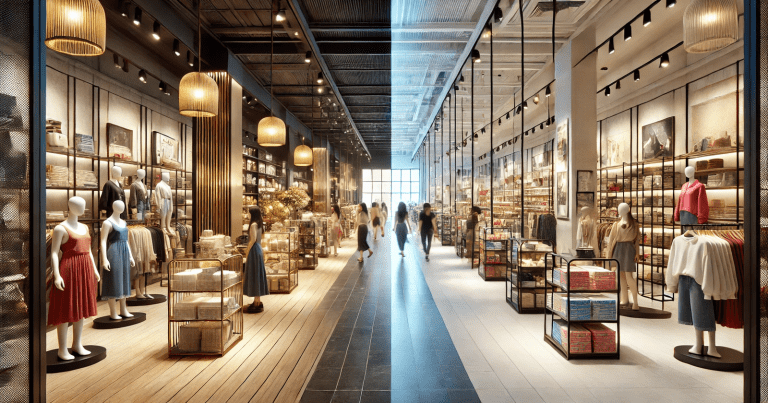Shopping habits have also changed over the years, and various types of retail formats suit the diverse requirements of customers. Among these are departmental stores and multiple shops. Although the two offer commodities to the customer, they differ in the organisational structure, the goods they offer, and how they are managed. The main distinction between departmental stores and multiple shops is its organisation and type of shopping. Departmental stores house various departments under one roof, offering a wide range of products. At the same time, numerous shops are chains of identical stores located in different areas, focusing on uniform products and pricing.
Understanding the difference between departmental stores and multiple shops is important for any consumer and business operator. This makes the shopper shop wisely and aids the entrepreneur in choosing the apt retail format based on his commercial objectives.
What is Departmental Store?
A departmental store is a large-scale retail outlet providing various products in various sections or departments. The different departments of a departmental store specialise in specific product categories, such as clothing, cosmetics, home appliances, groceries, and electronics. The main goal of a departmental store is to give the customer a one-stop shopping experience. Popular examples in India are Shoppers Stop, Big Bazaar, and Lifestyle.
Features of Departmental Store
The features of a departmental store distinguish it from other retail businesses. The store provides a premium shopping experience to satisfy customers and simplify their jobs.
Centralised Location
Most departmental stores are in major city centres or developed shopping malls. This attracts many customers while keeping life handy for people living around or passing by the area.
Large-Scale Operations
Departmental stores are operated on a large scale and require huge investments. They have various sections and trained staff for good service. The stores have efficient management for handling many customers daily.
Modern Infrastructure and Facilities
They are offering air-conditioned spaces, escalators, elevators, and parking facilities. They focus on providing customers with a comfortable shopping experience so they can have a good time while shopping.
Customer-Focused Services
Departmental stores offer home delivery, gift wrapping, product exchange, and instalment payments. Many others provide loyalty card programs and special discounts, especially for their daily customers.
Strong Brand Presence
Most department stores are part of large retail chains, and they ensure the quality and trust of the brand. They attract more customers because of their good branding and marketing strategies.
Types of Department Store
Various department stores are available in different forms that serve different customer needs. A look at the most common types follows.
Single-Unit Departmental Store
A single unit or departmental store is located at an impressive location and runs independently. It sells various product categories within one roof, making it convenient for shoppers. Shoppers Stop is one of the standalone stores located in malls.
Chain Departmental Stores
A chain of departmental stores operates many retail locations under the same brand name. This type of store ensures uniform pricing and stock with the same products at all their chains. The big chain departmental stores are Big Bazaar, Lifestyle, and Pantaloons.
Discount Departmental Stores
Discount departmental stores specialise in selling branded products at reduced prices. They attract budget-conscious customers, where items are sold on discount and value packs. D-Mart and Vishal Mega Mart operate in this category, and affordable quality products are rendered to customers.
Advantages and Disadvantages of Departmental Store
Departmental stores simplify shopping, offering hundreds of thousands of products in a one-roof facility. It benefits the consumer directly and the business through efficient management and price competition. In addition, they have specific challenges that affect their operations and customer experience.
Advantages of Departmental Store
Departmental stores provide an easy and stress-free shopping experience with various products under one roof. They use modern infrastructure and management systems to serve customers’ needs conveniently.
- Availability of all Facilities: Time and worry are saved since all facilities are available in one place with all customer demands.
- Better Experience for Customers: Updated store layouts, an air conditioning store, and the provision of parking facilities will make shopping better for customers.
- High-Quality Products: Most of the well-known departmental stores sell brand products, and therefore, there is reliability.
- Competitive pricing and offers: It attracts customers with constant discounts and promotion sales.
Disadvantages of Departmental Store
Departmental stores may be convenient for consumers and provide various products, but they have many problems.
- High Operating Costs: Large stores require high investment to maintain modern infrastructure.
- Expensive Products: Fixed pricing can exceed small retail shops and local markets.
- Competition with Online Shopping: They prefer shopping online as it is cheaper and more convenient.
- Limited Personalization: Unlike small retail shops, departments may not attain personal contact with the customers.
What is Multiple Shops?
A multiple store is a chain of retail outlets operated by the same company, selling the same or nearly the same product in different locations. Uniform pricing, product selection, and branding provide consistency for the customer regardless of which store is visited. Stores are centrally managed to ensure the operation runs efficiently and saves costs.
Reliance Digital is an electronics retail store chain in India, while Big Bazaar is a supermarket chain run under centralised management. D-Mart operates a discount retail store selling groceries and household essentials. Shoppers Stop operates multiple stores selling fashion and lifestyle products, while Apollo Pharmacy operates a wide medical retail chain selling pharmaceutical products.
Features of Multiple Shops
This retail format is efficiently functioning and does have the best reputation; it features multiple stores. They follow a business strategy that is so designed that there are no complaints at any store.
- Central Management: One corporation sets prices for all stores, establish product assortment methods, and supervises operations. This sort of Framework ensures that each retail outlet complies with the same stated policies and strategies.
- Wide Geographical Presence: Stores are located in all regions, expanding the company’s reach. Companies selectively put up stores across cities and towns to attract optimum sales.
- Standardised customer experience: A similar level of service quality and the same product quality are encountered in each store. Loyalty cards and special deals are successful everywhere.
- Efficient Inventory Management: A central system tracks all the stock levels across all the stores, and automatic replenishments ensure that products are in sufficient stock.
Advantages of Multiple Shops
Multiple shops offer several benefits that help businesses grow and succeed in a competitive retail market.
- Cost savings via volume purchases: The company makes volume purchases to sell the goods at lower per-unit costs of goods purchased. Suppliers’ price discounts raise margins.
- Brand Loyalty and Recognition: It is trusted for its constant quality of goods and service. Good brand recognition also increases customer footfall.
- Better Market Reach: Multiple stores enable businesses to cater to a large customer base across different locations. Expansion helps in penetrating urban, semi-urban, and rural markets.
- Uniform Customer Experience: Standardized prices and product quality increase customer satisfaction. Customers can walk into any outlet and still enjoy the same services and products.
Disadvantages of Multiple shops
Despite the numerous benefits of a multi-store business, some obstacles may undermine its operations.
- Complex management structure: Multiple stores have a more complex management structure, as Handling many stores can be difficult and demands experienced administrators. Poor coordination leads to the ineffectiveness of managing inventory and customer service.
- Higher Operational Costs: Multiple stores will involve high rent, high salaries, and increased maintenance costs. Other costs incurred would be the consumption of electricity, security and logistics.
Difference Between Departmental Stores and Multiple Shops
Understanding the difference between departmental stores and multiple shops helps consumers and business owners make informed decisions. Departmental stores are large, single establishments with multiple product categories under one roof, while numerous shops are a chain of stores offering the same products in different locations.
- Structure and Organization: Departmental stores have different departments under one large store, whereas multiple shops work as identical outlets in different locations.
- Product Range: Departmental stores offer many products, whereas multiple shops generally deal with specific product categories.
- Management: Departmental stores have centralised management for all the departments, whereas multiple shops have separate management for each outlet.
- Customer Experience: Departmental stores provide a comprehensive shopping experience with added services, while multiple shops offer convenience and uniform pricing.
| Aspect | Departmental Stores | Multiple Shops |
| Structure | Single store with multiple departments | Chain of identical stores |
| Product Range | Wide variety of products | Limited, specific product categories |
| Management | Centralized management | Separate management for each store |
| Location | Urban centers or malls | Spread across various neighborhoods |
| Pricing | Varies by department | Uniform pricing across all stores |
| Services | Additional services like home delivery | Limited additional services |
| Floor Space | Large, multi-floor spaces | Smaller, standardized store sizes |
| Target Audience | Broad, diverse customer base | Specific customer segments |
| Examples | Macy’s, Harrods | McDonald’s, Starbucks |
| Inventory Management | Centralized inventory system | Decentralized inventory management |
| Visual Merchandising | High emphasis on display | Standardized store layout |
| Promotions | Store-wide promotions | Consistent promotions across locations |
| Staff | Large staff for different departments | Small, consistent staff size |
| Loyalty Programs | Comprehensive loyalty programs | Basic or uniform loyalty programs |
| Technology Integration | Advanced POS systems | Standard POS systems |
| Ownership | Usually owned by corporations | Can be franchised or corporate-owned |
| Expansion | Limited to major cities | Easier to expand in different regions |
| Brand Recognition | Strong brand presence | Consistent brand image across locations |
| Shopping Experience | One-stop-shop convenience | Quick, convenient access |
| Price Flexibility | More flexible pricing | Fixed pricing across stores |
Departmental Stores vs Multiple Shops FAQs
What is the main difference between departmental stores and multiple shops?
The main difference between departmental stores and multiple shops is that departmental stores offer a wide range of products under one roof, while multiple shops are chains of identical stores focusing on specific products.
What are multiple shop examples?
Examples of multiple shops include McDonald’s, Starbucks, and Subway, where each outlet offers the same products and services.
What are the advantages and disadvantages of multiple shops?
The advantages of multiple shops include consistent product quality and pricing, while the disadvantages of multiple shops include limited product variety and less personalised service.
What are the features of departmental stores?
The characteristics of a departmental store are broad product range, departmental organization of goods, centralized management, and many other services including home deliver and loyalty programs.
What is a retail store?
A retail store is a business that sells goods directly to consumers, including formats like departmental stores, multiple shops, supermarkets, and specialty stores.


